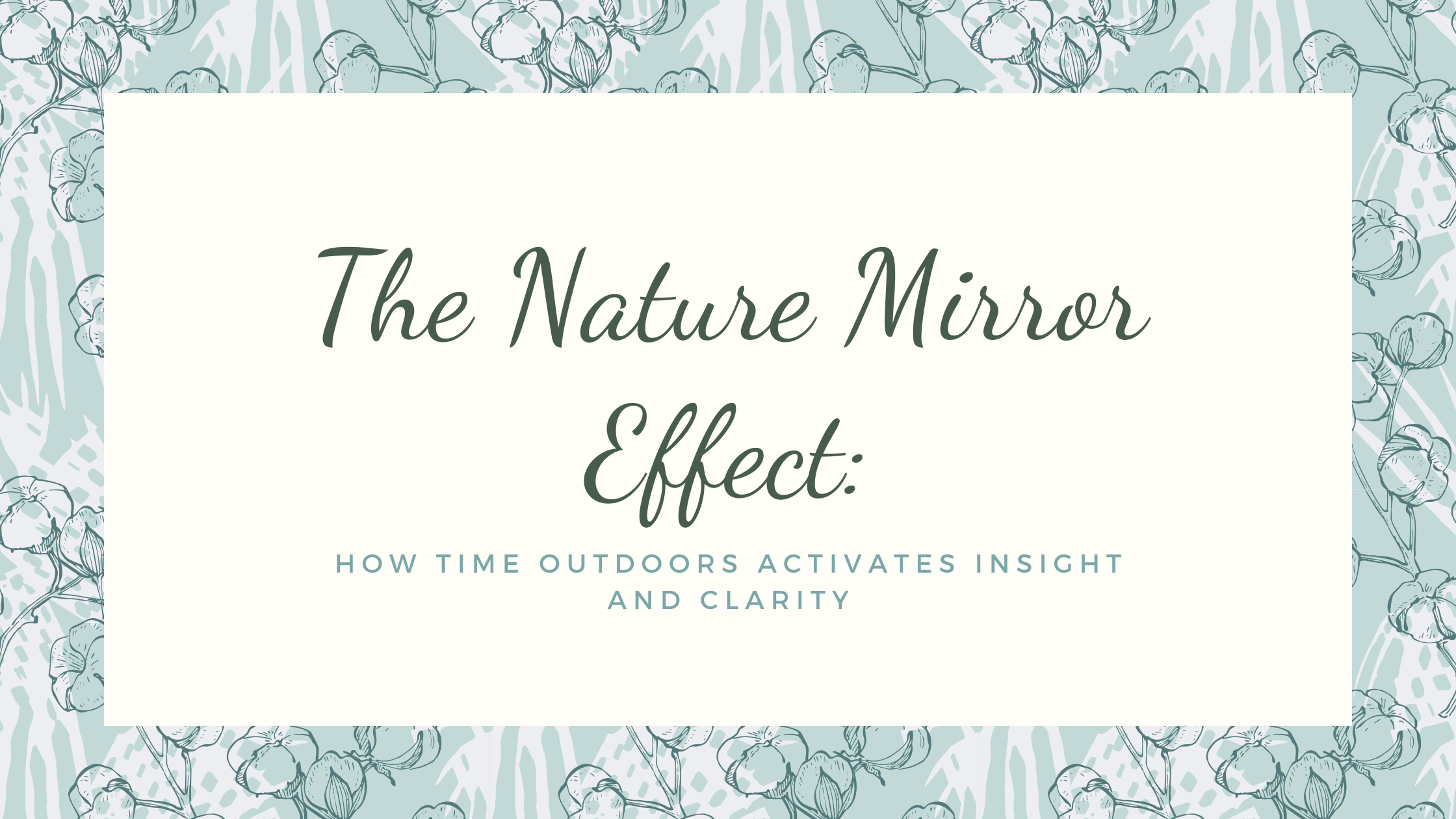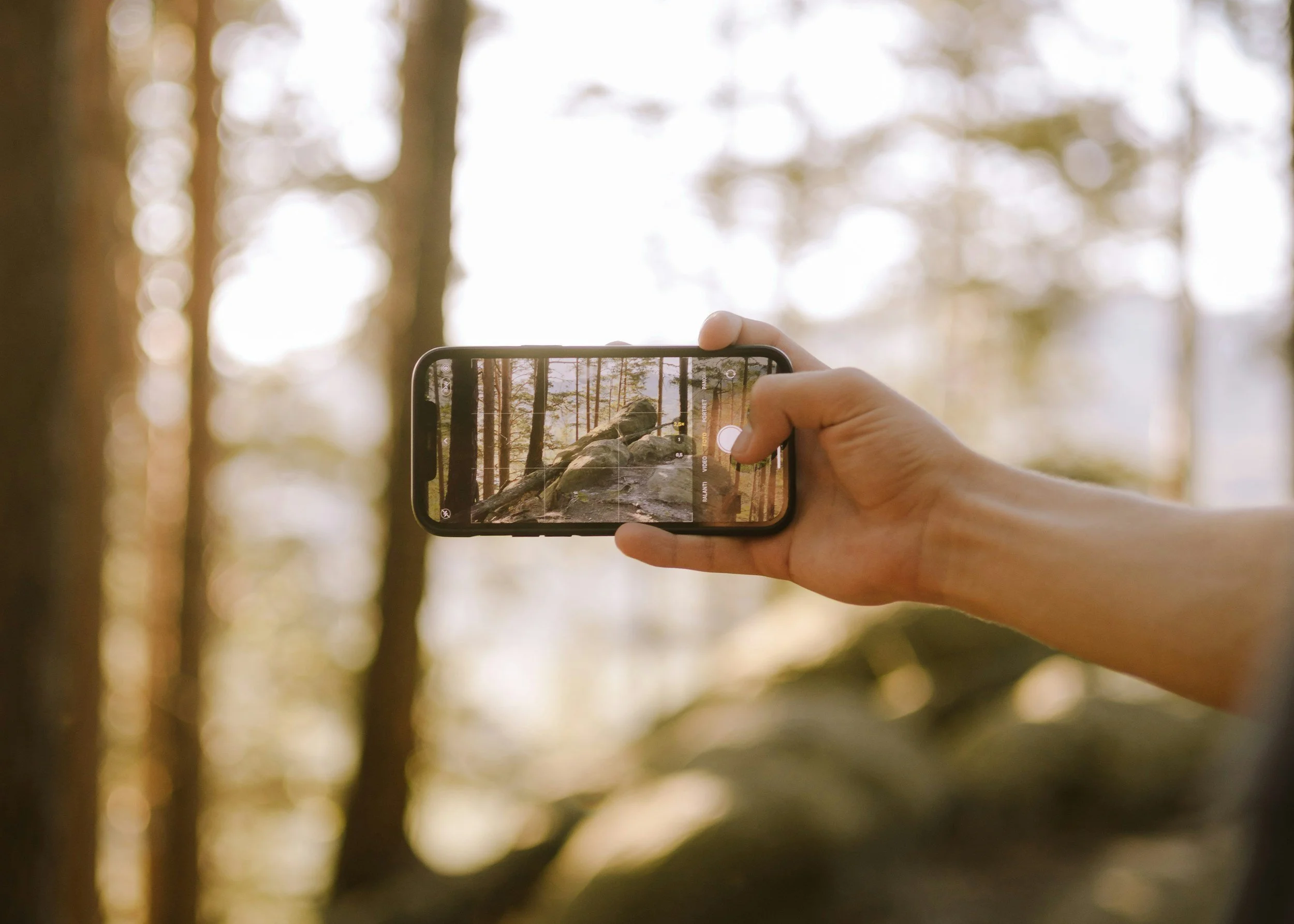The Nature Mirror Effect: How Time Outdoors Activates Insight and Clarity
What If Nature Knows You Better Than You Think?
Have you ever stepped outside feeling tangled in your thoughts, only to find that after a short walk among trees, the knots begin to loosen?
Maybe a breeze carried your worries a little further away. Maybe a robin’s song broke the spell of overthinking. Or maybe, without quite knowing how or why, you suddenly saw things more clearly.
This is the Nature Mirror Effect. A quiet, transformative experience where nature reflects our inner world back to us, not with judgment, but with gentleness. It offers insight not by pushing or fixing, but by simply being.
In this blog, we’ll explore how time in nature reduces self-criticism and deepens self-awareness, drawing on both psychological research and personal insight. We’ll unpack why this matters, especially in a world that often pulls us away from ourselves. And most importantly, you’ll learn simple, nurturing ways to experience this effect for yourself.
What Is the Nature Mirror Effect?
The Nature Mirror Effect is the phenomenon where the natural world subtly reflects our inner state back to us. It creates space for clarity, calm, and deep personal insight, without the need for over-analysis.
Rather than offering advice or solutions, nature meets you where you are. A gnarled tree, a slow river, shifting clouds, all of these can mirror feelings, thoughts, or truths we’ve pushed aside. And unlike people or screens, nature never interrupts or demands. It simply is.
This idea is echoed in practices like:
Ecopsychology – exploring the link between mental health and the environment
Shinrin-yoku (Japanese forest bathing) – the restorative practice of simply being in the forest
Mindful nature connection – using awareness and presence to deepen our relationship with the Earth
Unlike traditional introspection, which can sometimes spiral into rumination, the Nature Mirror Effect offers a grounded, embodied experience. We don’t have to try to figure ourselves out - we just need to be present.
The Science Behind the Mirror
You don’t need to be spiritual to benefit from this. Science backs up what many of us intuitively feel: nature soothes the mind and supports self-reflection.
A. Nature Reduces Rumination and Self-Criticism
A 2015 Stanford University study found that participants who took a 90-minute walk in nature experienced significantly less rumination, repetitive, negative thought patterns, compared to those who walked in urban environments.
Brain scans showed reduced activity in the subgenual prefrontal cortex, a region linked with brooding and self-critical thinking. In short: time in nature gives the overthinking brain a break.
B. Nature Boosts Insight and Self-Understanding
Research from the University of Derby showed that nature connection increases levels of self-awareness, emotional regulation, and resilience. Participants reported greater ability to reflect on their lives, values, and emotions after engaging with nature mindfully.
This aligns with the Attention Restoration Theory (Kaplan & Kaplan), which suggests that natural environments restore mental clarity and reduce cognitive fatigue. Nature’s “soft fascination”, think rustling leaves, flowing water, gently holds our attention, freeing up mental space for reflection.
When the mind is less busy defending, explaining, or fixing, clarity arises naturally.
How Nature Mirrors the Inner Self
Nature doesn’t speak in words, but in metaphor. Here are just a few of the many ways the landscape can reflect our inner experience:
A twisted branch might mirror how you’re feeling pulled in too many directions
Still water could invite you to settle and become quiet inside
A fallen log may remind you of the beauty in resting or letting go
A path vanishing into fog can reflect the unknowns you’re navigating in life
These aren’t just poetic thoughts, they're deeply personal connections that often arise in quiet moments outside.
I’ve seen this countless times during my mindful walks and workshops. One woman, grieving a loss, paused under an old yew tree. She later shared that its hollow trunk felt like her own hollowed heart, and also a place where life could begin again.
Another participant said watching a snail cross a muddy path helped her realise she didn’t have to rush her healing. These moments might sound small, but they land deeply. And they often stay with us long after we return indoors.
Why It Works: Nature's Conditions for Self-Insight
Unlike therapy rooms or self-help books, nature doesn’t offer instructions. It offers conditions and these conditions are ideal for gentle reflection and insight:
1. Silence and Space
No notifications. No social expectations. Just quiet enough for your inner voice to rise to the surface.
2. Beauty and Awe
Studies show that feelings of awe expand our sense of time and increase generosity, patience, and open-mindedness. Nature is full of micro-moments of awe, sunlight through leaves, a mushroom emerging from soil.
3. Slowness
Nature doesn’t rush. It invites us to move at the pace of presence. When we slow down, emotions can catch up. Truths emerge. We breathe.
4. Embodiment
Being outdoors reconnects us with our senses. The sound of birds, the feel of grass underfoot, the scent of pine, they all draw us out of overthinking and back into the body, where clarity often resides.
Simple Ways to Try the Nature Mirror Effect Yourself
You don’t need to hike deep into the wilderness. The Nature Mirror Effect can be experienced in a garden, a city park, or even with a single tree or plant.
Here are some gentle invitations to try:
1. Go on a Slow, Silent Walk
Leave your phone behind. Walk without needing to get anywhere. Notice where your attention is pulled, what draws you? What repels you? How does your body respond to the landscape?
2. Practice Mindful Photography
Let your camera (or phone) become a tool for inner reflection. What are you drawn to photograph? Patterns, shadows, contrasts? These images often mirror what’s happening inside.
3. Try Nature Journaling
Bring a notebook outdoors. Sit quietly, observe, and write freely. What do you notice in nature and what thoughts or emotions arise in you? No need for structure, just let it flow.
4. Choose a “Sit Spot”
Return regularly to one small place in nature. Over time, you’ll build a relationship with this space. You’ll begin to notice subtle changes, and these changes often reflect shifts within you.
When the Mirror Feels Uncomfortable
Not all reflections are easy to see.
Sometimes, nature shows us our grief, anger, or fear. It might hold up a mirror to our restlessness or numbness. But this, too, is healing. The natural world doesn’t judge what it reveals, it simply holds it, gently.
If discomfort arises, pause and breathe. Let yourself be with it, without rushing to fix it. You’re not broken, you’re just remembering parts of yourself.
Conclusion: Returning to Your Inner Clarity
In a world that tells us to look outward for answers, nature quietly invites us back to ourselves.
The Nature Mirror Effect isn’t magic or mysticism. It’s presence. It’s the way a breeze can lift a mood, a birdcall can spark a memory, a quiet moment under trees can offer more clarity than hours of thinking.
You don’t have to go far. You don’t have to do it perfectly. You just have to notice.
Try This Today
Next time you’re outside, ask yourself: What part of this landscape feels most familiar to me right now? What might it be showing me?
You might be surprised at what surfaces.
If you’d like to explore this deeper, you’re warmly invited to:
🌱 Read more mindful nature blogs at www.naturally-mindful.co.uk/blog
📷 Try my free Mindful Photography Prompt Pack
🌳 Join one of my local North Somerset Mindful Walks or women’s circles
You are not separate from nature. You are nature. And you are enough, just as you are.






